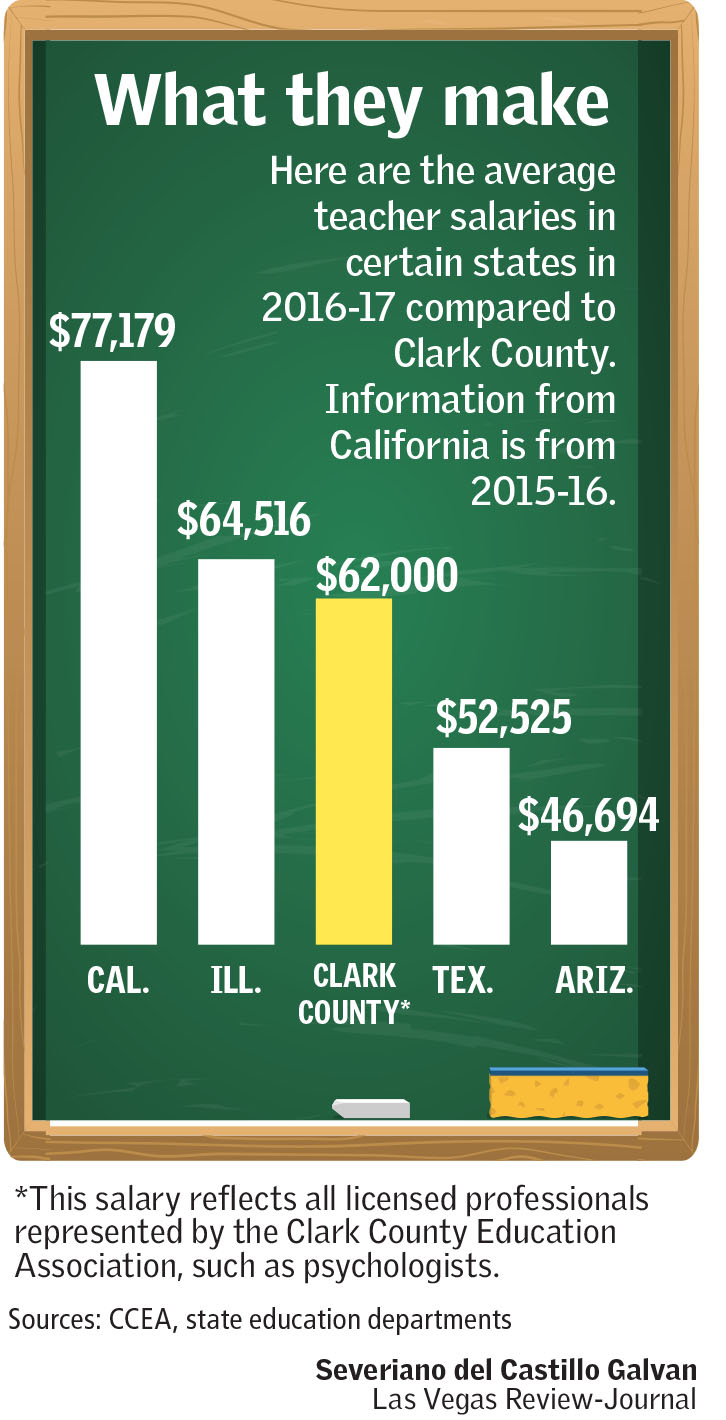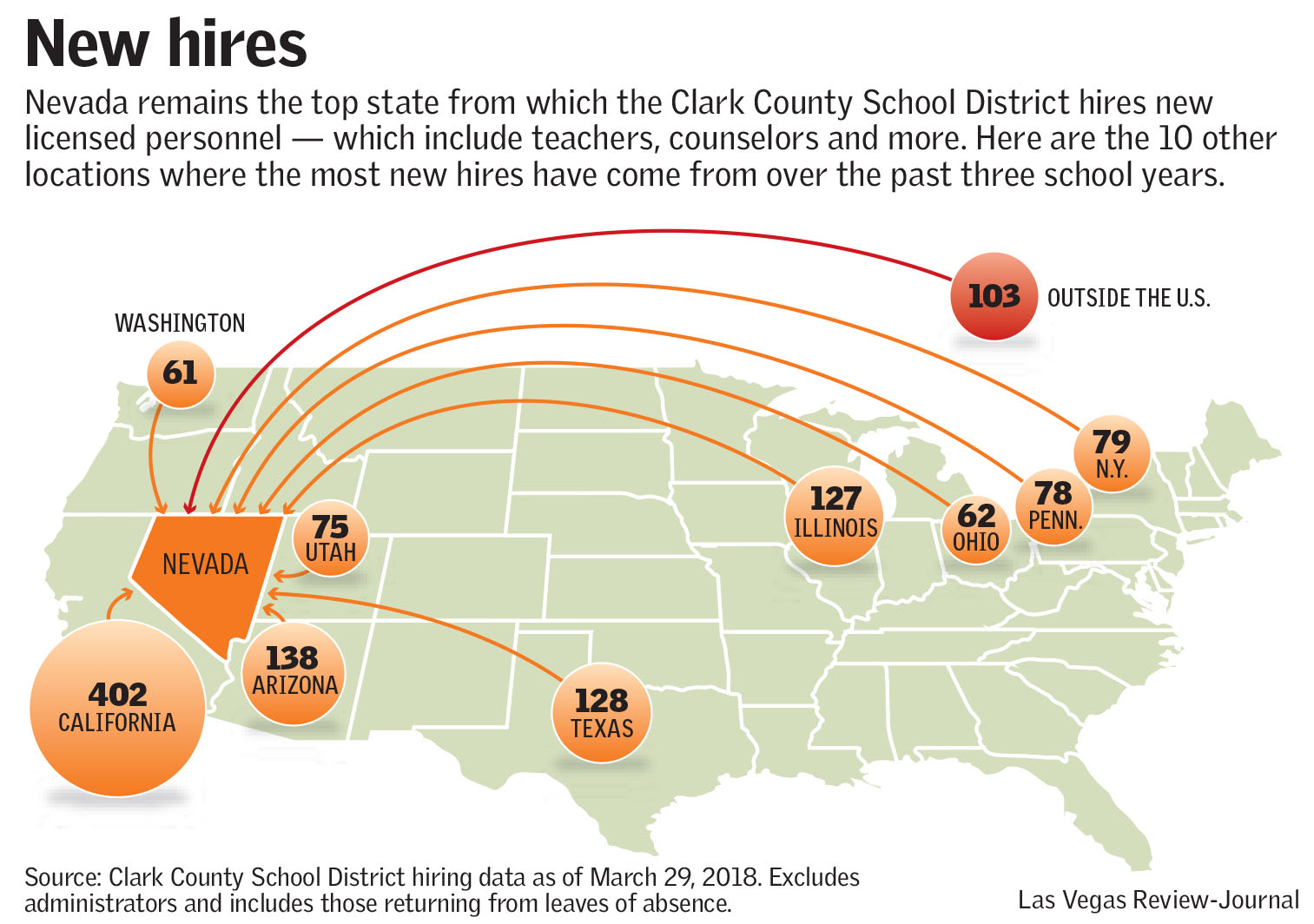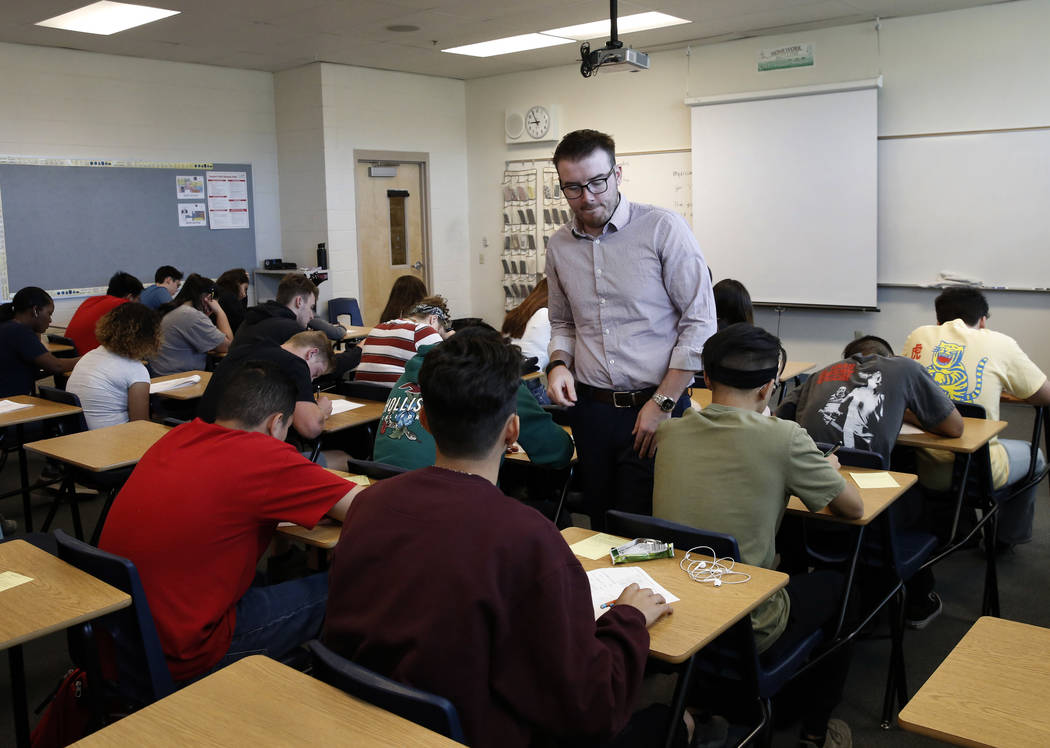Clark County schools cast wide net to fill teaching vacancies
In his first year out of college, Spencer Skees filled in for a teacher on maternity leave in his native Indiana.
He was looking for a new job upon her return when someone at his school mentioned that they had heard about Nevada’s teacher shortage on the news.
“I had put applications out a lot of places, but Nevada … they were like the first people to really get in touch with me,” he said this week. “So I just kind of started to roll with it, and one thing led to another.”
Now Skees is in his second year as a math teacher at Desert Oasis High School.

He’s one of the 2,156 licensed personnel — a category that includes teachers and other positions such as counselors — who have joined the Clark County School District from outside the Silver State in the past three years.
Facing an ongoing teacher shortage, the district has mounted targeted recruiting efforts throughout the nation in recent years.
A Las Vegas Review-Journal analysis of data from the 2015-16 school year through March 28 found that, though Nevada provides the district with the most licensed personnel, nearby states like California and Arizona also are big contributors. The figures include people who are returning from leaves of absence.
Many others arrive in the desert from farther afield, from states like Texas, Illinois and New York and overseas — especially from the Philippines.
While the district looks far and wide to fill its vacancies, it concentrates on “places that have what we consider an oversupply of teachers, which means that they produce more teachers than they have jobs,” said Tya Mathis-Coleman, the district’s director of recruitment.
It’s a battle that’s never-ending. At the start of school this year, the district had 539 teaching vacancies.
Recent recruitment initiatives
The district added spice to its recruitment effort in 2015 with the launch of a “superhero” campaign that portrayed teachers as cape-clad, Superman-like figures.
The next year it offered to match or beat the salaries educators received in their previous position, within limits.
California is currently a prime target, with the district hosting its own recruitment fair there the past two springs.
“What we’ve found is it’s easy for us to recruit in states that touch our state,” Mathis-Coleman said. “People are more likely to drop everything and move to a state that’s close to home.”
At the same time, recruiters continue to look outside the country, particularly to the Philippines.
In the past two years, the district has hired 187 teachers from the Philippines to teach special education — positions that are particularly hard to fill.
That’s because the Philippines has an oversupply of special education teachers, Mathis-Coleman said. They are able to obtain J-1 visas that allow them to teach in the U.S.
Retention of such teachers has been successful — 79 of the 81 hired last year are back this year, according to the district. Another 106 were hired for this school year.
“Every single J-1 teacher that we hire has previous experience in a special education classroom,” Mathis-Coleman said. “So we’re not hiring teachers that are new to teaching special education. They have previous experience, and they also have master’s degrees in special education.”
Where they’re from
While some states that feed Clark County’s teaching pipeline might have a teacher surplus, others face many of the same challenges as Nevada in hiring and retaining educators.
Arizona, for instance, has struggled with teacher pay.
“Depending on what organization you look at, we’re one of the lower-paying states — if not the lowest-paying state — in the country,” said Shaun Holmes, president of the Arizona School Personnel Administrators Association. “That is a really big challenge for the state of Arizona.”
But the state recently passed an education budget that provides teachers with raises of 10 percent this year and 5 percent in each of the next two years.
“In my experience, this is probably singularly the best budget we’ve seen in decades,” Holmes said. “And I do mean decades, plural.”
That boost pushed the starting salary in Mesa Public Schools to $41,850, surpassing Clark County’s $40,900, according to Holmes.
In Los Angeles, where the average starting salary is $50,368, the school district had 113 vacancies as of Aug. 15.
Texas also faces a retention problem, said Clay Robison, public affairs specialist with the Texas State Teachers Association.
“The teachers that will start teaching this year, this fall — within five years, anywhere from 30 (percent) to 50 percent of them won’t be teaching anymore,” Robison said. “Because they really begin to notice the problem with salary after they’ve been in the classroom for a few years.”

Why they come
Cris Baker and her husband already had a two-year plan to leave California and come to Las Vegas.
“It wasn’t like, ‘Hey, I saw a billboard. Maybe we should move here,’” said Baker, a Title I strategist.
The main reason they wanted to move was to be closer to her husband’s family and friends, she said, but the cheaper cost of living also made a favorable impression.
“The housing is much cheaper out here, and of course there’s no state income tax, so that makes a big difference,” Baker said.
Once it attracts teachers, however, the district needs to keep them.
That can be a tough sell with overcrowded classrooms, issues with health insurance and a long-running contract dispute that was only recently settled.
Nicholas Mattaliano came to Clark County in 2013 from Chicago when his wife was offered a job here. But now, he said, he’s starting to think his teaching job is not worth the headache.
“I don’t understand why really anybody wants to stick around anymore if they’re going to keep screwing us on our pay, they’re going to keep screwing us on our benefits,” he said. “To me, it’s kind of to the point where you just have to love it so much that you’re willing to essentially almost be like a volunteer.”
Contact Amelia Pak-Harvey at apak-harvey@reviewjournal.com or 702-383-4630. Follow @AmeliaPakHarvey on Twitter.































